Rab Fulton
The Woman Who Was Not Adele
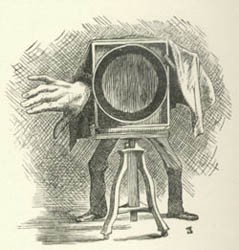 1. The Photographer
1. The Photographer
My real name is Judith Peters. Yes, the photographer. No, you wouldn’t have recognised my face. Apart from private family pictures I have never had a portrait taken of me, and never will. Journals and galleries used to complain about this, but now they simply accept my little quirk. I don’t ban photographers from opening nights of my work. But I always keep to hand a blow up of one particular picture of mine, which I use to cover my face. Yes you know the picture. It’s also the one I use in any publicity, or to accompany interviews with me in newspapers. The picture is a black and white piece called ‘Three Angry Men’ and it was taken, oh, a couple of days before I became Adele.
Actually, the title of the picture is not quite accurate. Only two of the men were angry – the third, the one in the centre of the picture, was way beyond anger. His feeling towards me was hatred, an intense almost religious hatred. The reason? I had spoiled their photo shoot. Of course now, ten years on, I think they’ve all come to hate me but in a less focused way. They despise the fact that their own work and reputations are inexorably linked to that one little picture of mine.
My reputation was already growing when I was sent on an assignment to Africa. I was to take pictures of markets and women for an internationally respected women’s journal. It was fascinating work that took me all the way from Namibia in the south west to Kenya in the mid east. The Africa I discovered was a place of noise and dust and constant wheeling and dealing. In Kenya I toured around Murang’a taking pictures of women working in fields, debating in the food co-operatives, selling their wares in the markets.
My favourite picture was one taken of Leona, a grandmother standing at a table creaking under the weight of carrots and pumpkins. Her brow was etched with deep lines and her eyes were staring straight into the lens. She looked ferocious, but her expression was undermined by that of her grandson. He stood beside her, grinning and holding up a toy car he’d made from old tin cans. No sooner had the picture been taken than the trader laughed and slapped her belly with glee. Through the translator she explained that I had just witnessed a fine example of the special scary face she reserved for anyone trying to wheedle a bargain from her.
‘Well I’m glad I’m not trying to get a bargain,’ I said.
As the translator explained my words, Leona stopped smiling, pointed at me and began a heated and very loud tirade. The translator hurried out an English version of Leona’s concerns. ‘It is very cheap to take picture. Very easy. It tells nothing. It is not enough. There is more to food. It is political. There are some men they sit on their arses and rape women who complain. They are keeping us poor. From the villages up to the president. Such men are keeping us poor. Poor and ignorant. That’s why we need the markets. You need to take other pictures. Pictures that explain the politics. My friend her back is still bleeding. Take a picture of her back. I’ll take you to the graveyard; show you the graves of murdered women. Take a picture of the court house were no man has ever been put on trial.’
I did not know how to respond to this. To be honest part of me was frightened by the woman’s anger. Standing in the heat and the noise of a Kenyan market I thought of my friend Susan, wished I could talk to her, ask her for advice. She was more confident than I, had been ever since we were teenagers. Susan was the one who, on surviving all the storms and dreams of early youth, suddenly found she had the skills to handle others pain and anger with calmness and confidence. It was she that went on to do advocacy work for women, whilst I talked the talked but kept my distance from anything so difficult, so messy.
Susan would have made damn sure I listened to Leona and took up the challenge she had thrown at me. But my friend was not with me, and so I merely nodded and, unable to think of any other response, mumbled, ‘yes.’ This was not an affirmation, just me getting through a tricky moment, buying time until I could contact my editor and ask her advice. If my editor said yes I would go ahead and take the pictures Leona desired. If she said no then I knew I would not push her.
Leona nodded back, put her hand out and spoke to me. I took her hand. ‘It is a deal’ the translator explained, ‘You will take these other pictures and Leona will let you take more pictures of the women working.’ Leona smiled and gave me a watermelon. ‘It’s not for free,’ said the translator, ‘its part of the bargain.’
When I returned to my hotel the receptionist told me my editor had phoned three times asking that I ring her immediately. I called to discover that there had been a change to my schedule. An opportunity had arisen, my editor cheerfully explained, for more dramatic pictures, transport was already organised. I considered telling her about the opportunity raised by my encounter in the market but another part of me was pleased that I could not get one word to pierce my editor’s fast enthusing monologue. My contented resignation, however, gave way to dread as she explained what my new assignment was.
Brutal faction fighting had broken out in the Bomi area of Liberia. There was still plenty of food, but the rebels were forcing the peasants to hand it over to them. Now people were fleeing to the bush and famine was threatening them. My job, so my editor enthused, was to go get a picture that would tell the world all. ‘Don’t worry,’ she assured me, ‘you’ll be meeting up with a group of experienced journalists and armed guards. Just get in, take those strong human interest pictures, and get out again – and your bonus will be in the post.’ I left my Kenyan hotel within the hour, handing a tip and the watermelon over to the receptionist.
Getting to my new assignment involved crossing the continent in a series of planes, each smaller and louder than the last. The drilling, rattling, shaking of the propellers prevented any sleep, yet I was beginning to grow more excited as my destination drew closer. Liberia and its internecine bloodshed was a dreadful abstraction to me. Famine, however, was something that I understood with perfect clarity. Some of the most iconic images of the 1990s were of the starving, their hands as thin and fragile as bird claws, ribcages all but exposed except for the merest coating of skin, children’s bellies ballooning with air and their eyes staring and groggy. Now it was my turn to find at first hand the art and humanity amongst the dying and the dead.
It was night when the plane landed in Liberia, and in the sudden blackness and silence my body ached for sleep. A porter took my bags and equipment, loaded them into a jeep. I was so exhausted that he had to help me step up into the vehicle. I heard the ignition turn over and then nothing else. I must have awoken at some point for I have only the vaguest dreamlike memory of getting out the jeep, walking to the large marquee tent set up for the press corps to rest in, and clumsily stuffing my fully clothed body into a sleeping bag.
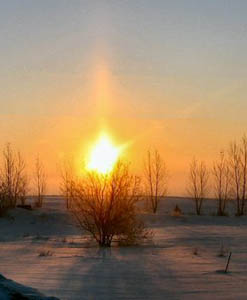 2. Dawn Preparations
2. Dawn Preparations
Lying on the ground I slept even more soundly. Only for the briefest of moments was I aware of being cushioned by the blackness and the night song of insects. I could feel such calm beauty begin to shape my dreams, to pull me down deep into absolute rest and contentment. And then I was asleep and aware of nothing until I was awoken by a deep male voice saying ‘time to arise, dawn is almost on us.’
I opened my eyes and saw a man in his thirties smiling down at me. ‘I’m Bernard,’ he said in a thick Parisian accent, ‘one of your fellow photographers.’ I sat up, yawned, muttered, ‘I’m Judith,’ and looked around the tent. Electric lamps illuminated the interior, throwing weird disjointed shadows from piles of equipment. Men moved about the cluttered space, their shadows stretching and shrinking as they passed back and forth across the lights. I had slept well but now I felt cold, hungry and disconcerted as my eyes tried to adapt to the interchange between the dazzling splotches of lamplight and the ever-changing silhouettes of my companions. ‘Come,’ said Bernard, stretching out a hand, ‘Tommy’s almost finished making breakfast.’ I took the outstretched hand, allowed myself to be pulled up into the waking day and all its frantic activity.
Outside, a long scarlet line cut horizontally across the blackness of night. Dawn was beginning. European and American journalists, photographers, and camera crews mingled with local drivers, translators and security guards. Three open backed trucks waited, their engines rumbling, their exhaust pipes exhaling columns of fumes that shimmered before the fiery glow of the rising sun. Bernard came over with two other men and gave me a spoon and a huge bowl filled to the brim with porridge.
My three companions began eating, dipping and raising their spoons, chewing and swallowing at an incredible speed. I felt like Goldilocks confronted by three bears who’d been over doing the amphetamines. I began to pass this observation, but one of the men – Tommy from Newcastle – waved his spoon and growled, ‘Don’t talk, just eat.’ Bernard nodded his agreement. ‘Hurry, hurry,’ he spluttered whilst gulping down another mouthful of breakfast.
The third man – Joe – emptied his bowl, ran a finger round the inside and licked off the last remnants of the porridge. ‘This your first famine, doll?’ he asked in a deep Texan drawl. I nodded whilst munching and gulping as fast as I could. ‘Ah,’ he said sounding sympathetic, ‘and have you ever experienced any other disasters?’ I swallowed a thick wad of porridge, smiled and said, ‘My whole life’s been a disaster.’ Bernard laughed and choked, gobbets of soggy oats spurting out from his nose. Tommy scowled and began thumping the Frenchman’s back. Bernard regained his composure quickly, cleaned his face with one flick of his hand. He tried to talk but began to cough instead. He thumped his chest with his left hand, whilst pointing the index finger of his right at me. ‘Good,’ he said. ‘This is a very good attitude for a famine. You’d go crazy otherwise.’
Fed and watered we loaded the last of our equipment onto the back of one of the trucks. There were other Europeans getting on board, men and women from different disciplines of news reportage, but all of us were content to let Bernard organise the local help. Joe pushed a cameraman aside to make room for me to sit down beside him. ‘Us photographers gotta stick together, doll,’ he said. ‘What you’ll see here ain’t pretty, ‘n it’s us guys who get closer than anybody.’ Tommy, sitting across from us, nodded. I noticed a space beside him that nobody else dared to intrude on.
I could hear Bernard’s voice coming from the direction of the driver’s cab. He and some Liberians were talking in low quick whispers that made it difficult to grasp the content of their words. The Liberians sounded aggrieved; one voice even had a nasty angry edge to it. But Bernard’s voice coaxed, persuaded and eventually laughed. The Liberians joined in the laughter and in the back of the truck Tommy grinned. Joe nudged me. ‘Don’t worry about nothing doll,’ he said. ‘Bernard’s got it all sorted.’ At which, the Frenchman, a walkie-talkie and a pair of binoculars hanging from his neck, lifted himself into the truck. He shoved, trod and kicked his way past the journalists and camera crews, sat down beside Tommy, and then lifted his clenched fists up, like a prize boxer psyched up for his next bout. Tommy and Joe lifted their fists also, and the three men punched each other’s knuckles. Then all three turned to me. I felt foolish but happy, like the loner kid who’s suddenly been invited to play with the big boys. I raised my fists and my companions each took turns punching my knuckles. Tommy and Joe were clearly excited, but Bernard just looked very self-assured.
As the truck began to move, the three men began to talk to me about the nature of famine photography. Gradually though, with the vehicle jolting from side to side, their earlier excitement gave way to a more reflective mood. ‘It’s not an easy job,’ remarked Tommy, ‘not easy at all, but somebody’s got to do it.’ The sun rose and the day grew hot and uncomfortable. The breeze that touched us was dry, blood warm and gritty. ‘But it’s worth it,’ added Joe. ‘When you get that one unique shot.’ ‘True,’ agreed Tommy, ‘but it is hard. ‘Specially the children.’
Nobody spoke for a moment. The heat rose. My own enthusiasm faded, to be replaced with a slowly growing sense of trepidation. I had not fully considered what I was about to witness. Now in my mind’s eye, I imagined a terrible scene with the skeleton dead, lying in piles like the victims of Auschwitz whilst flies and dogs scavenged corpses for meals. My worry must have been apparent, for Tommy assured me, ‘You’ll do okay, you’ll just feel humble and pretty small for a couple of days after.’
Joe nodded his agreement, his expression one now of angry determination. ‘Damn right you’ll feel humble,’ he said, ‘but soon you’ll just feel damn glad to have a home and a bed and a ballot box to go back to.’ Bernard, up to now silent on the subject, raised a weary eyebrow, as if he knew from long acquaintance what Joe was going to say next. Joe must have seen the Frenchman’s expression because he now addressed him directly. ‘It’s true, Bernard. Famines, civil wars, all that shit, it’s exactly the kinda thing that happens when you let savages run countries.’ To which Tommy added, ‘Damn right, Joe, damn right.’
Bernard turned to face me. ‘Such conversations happen amongst those who bear witness to our world’s man-made horrors.’ He paused for a moment, and instead of interrupting him, his companions watched him patiently. I realised then that I was witnessing a ritual act that, having begun with the enthused fist punching, was now complemented by this chorus of opinions and reflections. Bernard, who had initiated the ritual, now brought it to a close.
‘It is not easy to understand why these things happen. Life and death are a mystery we all have to confront, but here at a famine it has to be confronted on a huge scale.’ He paused once more, considering his words, and I noticed that everybody in the truck was watching him. ‘What we have been afforded is a moment to look as deeply, if imperfectly, as we can into the very warp and weave of God’s infinite tapestry. To humbly snap our pictures as best as we can, knowing that even the best of them can only provide the merest sample of something that is far vaster than all of us. We can only provide pictures, never any answers.’
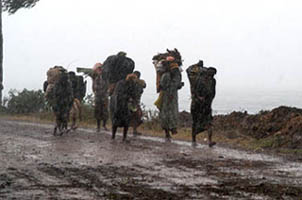 3. The Refugees
3. The Refugees
As Bernard talked, so the truck slowed down, and soon it stopped all together. ‘We’re here,’ I said, unable to hide the fear in my voice. Bernard looked at me as he struggled to stand up. His eyes met mine and he gave a slow conspiratorial wink. The tailgate was now open and the other media people were scrambling off the truck. Tommy and Joe stood up, then they each reached down, grasped one of my hands and pulled me up onto my feet. ‘Go stretch your legs,’ Bernard said, ‘but stay near the truck.’ He then spoke into his walkie-talkie for a few moments. I watched him, surprised that he seemed to be in no hurry to leave the truck and take the pictures he had so eloquently defended. I stood considering him, wondering if he perhaps was as afraid and uncertain as I, his words a failed attempt to lift his own confidence.
‘Judith!’ a voice cried out. I turned. Tommy and Joe were now out on the ground, waving at me to join them. ‘Come on doll,’ called Joe, ‘stretch your legs while you can.’ I took one more look at Bernard; saw that he was peering through his binoculars, slowly moving his gaze across the scrubland. Ignoring Tommy and Joe’s outstretched hands I leapt from the truck, and landed in the quiet clinical horror that was a late twentieth century famine.
I had steeled myself for the dead, was prepared to see them lying in piles. And maybe in recesses of my mind I had hoped for the dead, the inanimate, silent, uncomplaining, unpleading dead. Instead I was confronted by a more dreadful spectacle – a long line of the living stretching from the tents of the improvised field hospital out to the distant scrubland. The refugees consisted mainly of emaciated mothers and their children. It was impossible to say who were the more pitiful, the naked – with the hollowness of their bodies exposed – or those dressed in squares and rags of cloth, the flapping and hanging of which emphasised how utterly lacking of content they were. There was only the occasional elderly man, most men and older boys having being conscripted into one of the many armed forces.
As I watched, a group of Aid workers slowly moved along the line. An African doctor inspected a child whilst a young European took notes. I later learned that inside the tents were the necessities for confronting and measuring such a disaster, including scales for weighing children, and supplies of powdered milk. Around the refugees and the Aid workers the international media recorded the occasion. Photographers crouched and journalists talked into camera lenses with their backs to the starving supplicants. The murmuring of the affected was made all but inaudible by the whir, click and prattle of the news makers.
The true horror of the event was not the disquieting contrast between viewer and victim, nor the awful physical dilapidation of the refugees. What disturbed me most were the smiles on the faces of the starving as they received the attention of the Aid workers. What I learned then was that smiles are not only reflections of happiness or expressions of joy. The smiles of those skeletal mothers was an act of beseeching, a plea for the child to receive just a little more attention, a little more hope. Those smiles were the last defence, the last sorry weapon that each woman used to shield their children against the final impact of the catastrophe they had been powerless to prevent.
I stood, one more well-fed viewer, trying to understand what all this meant for me, as a woman, a fellow human, as someone who one day planned to have children. I needed to articulate myself, to talk or even shout out my confusion and hurt and horror, but found myself dumbfounded and motionless. I could only stand and stare, and would doubtless have stood there for ever if it hadn’t been for the fast clicking shadow that passed by my face.
Startled I stepped back just as Tommy once more clicked his fingers in front of my face. ‘Bernard is ready,’ he said, ‘We need to get back to the truck, quickly but without drawing attention to ourselves.’ He winked as he said this, and I felt dizzy. It was as if I had suddenly slipped faster than the speed of light from a vast universe of hurt into the small intimacy that was the plans and concerns of my three colleagues.
I walked towards the truck feeling detached both from what I had witnessed and from the solid ground. I seemed to float, and yet was capable of seeing everything with perfect clarity: the Liberian driver behind the wheel, Bernard standing in the back of the truck, pointing with one hand, and passing Joe his binoculars with the other, then both Bernard and Joe looking at me, each holding a shushing finger to their lips, whilst winking conspiratorially.
Then they smiled and the ground suddenly felt solid again. I had a place to be, a place to belong in, companions that I could talk to and understand. All this was the reality that awaited me in the truck. I began running towards that big chunky metal vehicle, desperate to escape the horror and helplessness that had almost overwhelmed me. I scrambled up the tailgate, turned around and hauled Tommy in. Bernard shouted, ‘That’s my girl,’ and smacked the roof of the driver’s cab. With a heavy puff of exhaust fumes the truck lurched forward.
As the truck gained speed I helped Tommy close the tailgate, then briefly stood up and looked back at the line of refugees. As stones pinged against the truck I watched a journalist point directly at me, and shout out, ‘Look.’ The men and women of the international media began turning round, some grabbed their equipment and ran towards the two remaining trucks. A small stone bit into my cheek and Tommy pulled me down shouting out, ‘Keep down – at this speed even pebbles can rip the skin off your face.’ Even as he spoke the truck picked up speed, bouncing up and down. Bernard, Joe, Tommy and I crouched down as stones and boulders rattled and pounded against the outside of the truck.
How to describe the exhilaration of that journey through a land I knew little of except it was blighted by civil war and famine and that I and my companions were without guards or guns? It was as if we were whalers from the nineteenth century, our harpoon caught deep in the back of some leviathan that bucked and raced and tried to shake us off, the very danger and precariousness of the hunt causing our excitement and determination to swell and roar louder than the elements around us.
So it was that my companions and I laughed even as we clung tightly to each other and the sand and stones broke in stinging lacerating waves over us. I had no idea where I was going or why, only that I felt incredibly alive and pleased that – for whatever reason – we had left all the other media personnel floundering behind us. I spat grit from my mouth and shouted out, ‘What’s happening?’ Bernard, Joe and Tommy called out in unison: ‘The shot! The shot!’
It was another ten minutes before the truck slowed down enough for me to ask my companions what they meant. Stones still rattled the side of the truck but with less force, and far fewer of them fell on top us. ‘There is a child,’ Joe explained, ‘that has wandered into the desert beyond the scrub.’ ‘And we are going to save it?’ I asked. Nobody spoke for a moment, then Bernard said, ‘If we can, but if not at least we can save its image for posterity.’
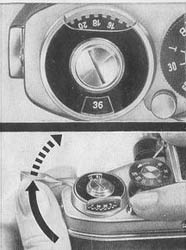 4. ‘The Shot!’
4. ‘The Shot!’
At that moment I saw the true natures of my companions. Whilst the other recorders of human tragedy had gathered round the refugees, they had been content to wait whilst Bernard scanned the horizon for a shot more worthy of their talents. And, having finally found it, the three had raced off, each to take their best shot at creating the one iconic image of Liberia’s tragedy. The winner of their game would be the one whose picture filled the front covers of the following morning’s newspapers.
Where did I fit into this? I was clearly not a serious contender in this battle for the perfect shot. Instead, I was merely a woman who they sought to impress, perhaps another prize in their game. Maybe I wasn’t even that, perhaps they simply enjoyed showing off to novices. But I found myself incapable of voicing my questions, instead I just watched wordless as the three men silently checked over their equipment and the truck slowed down to a halt.
Tommy opened the tailgate and jumped down. I stood on the edge unable to make the leap. Tommy raised a hand up for me, but I pushed it away. I turned my gaze to the horizon, hoping to see the two other trucks there. Bernard was standing beside me. ‘Don’t worry,’ he said, ‘we managed to lose them. Even if they do get here it’ll be far too late. We’ll have already got the shot and left.’ I did not know what to do. I was in the middle of a desert with three men who cared nothing for human life or suffering. I wanted to protest yet was frightened at how they would react. I picked up my equipment, forced myself to smile, and stepped down into the desert.
We walked up to the front of the truck. The driver and Bernard spoke for a moment, and then the Frenchman turned to us. ‘The child is about twenty yards in front of us,’ he whispered, ‘and a little off to the right.’ My companions nodded and stood for a moment double checking their equipment. I found that I, without any conscious effort, was aping the behaviour of the men. I too nodded, checked that I had a black and white spool in my camera, took a deep sip of water from the bottle proffered by Joe.
As I drank I had the briefest flash of my first communion. Susan and her family were in the Church but, being protestant, did not take part in the ceremony. I felt the way I did then, nervous, unsure of the whys and fors of the ritual but knowing it was an important part of growing up good, growing up in the embrace of God and His Mother. But any sense of religiosity, of accepting the pious reasoning of Bernard and his friend, vanished in the instant that we stepped in front of the driver’s cab and saw the child.
At first the child was a shimmering dark line against the boiling white sand and the boiling white sky. Though the form was broken and lacking focus, the sight of it touched me with an incredible physicality in my chest and in my womb. I knew without a doubt that what we were doing was an abomination. I gasped at the impact of this revelation, only to have Bernard take my arm and assure me, ‘It is all right. I promise we will be away from here in less than five minutes.’
We walked closer and the shape became firmer though still lacking any discernable features. I wanted to run to the truck, but my legs were shaky and I knew that it was only Bernard’s grasp that kept me upright. Another memory awoke in me, this time of a TV documentary on forensic science and a lab technician holding two bleached white bones held together by a dried out strand of ligament that was thin and blackened by age.
It seemed only a momentary recollection but by the time it vanished I found that we were a mere two metres from the child. Bernard was no longer holding me. He was kneeling on his left knee whilst balancing his camera on the right. Tommy was listening to Joe explaining something about bringing out the depth of light and shadow. The object of their attention stood naked and motionless. Though so emaciated I could not tell what sex the child was, somehow I felt it was a boy. That one fragment of identity – even if wrong – brought with it so many other questions.
What was his name, where was his family, and above all this, what thoughts were troubling the child? ‘Do we have spare water,’ I blurted out, only to have Bernard stare at me disapprovingly. ‘Keep your voice down,’ he said, ‘Loud noises and sharp movement will disturb the child.’ Joe and Tommy were now standing behind Bernard. When Joe spoke there was a trace of sympathy in his voice. ‘Come over here, doll,’ he whispered. ‘This is the perfect place.’
Instead I stepped in front of the three men, blocking their view of the child. Bernard hissed at me, whilst Joe held his hands up in a pleading way and Tommy’s gaze moved from one man to the other as if uncertain how to respond himself. I crouched and took a picture. Click.
‘Christ, doll,’ spoke Joe, his voice louder now, ‘don’t spoil this. Just get over here.’ But I was beyond any reason. I was too busy clicking the camera, capturing the growing anger of my three companions, all the time thinking: This child has a name – click. A language – click. Siblings, parents, grandparents – click. Memories of gifts and scolding – click. Of treats – click,click,click,click. Of sitting on his mother’s knee whilst she explains where stars come from and why worms wriggle and toads leap – click.
Each snap shot revealed the progression of my companions’ rage. In the third picture Bernard is still kneeling, pointing his finger straight at me, his teeth clenched, his lips apart, Joe behind him lips pursed his head facing slightly to the right but his eyes still looking at me. And Tommy beside him his face still quizzical but with a slight blush of growing anger.
In the last picture, the one known as ‘Three Angry Men’, Bernard is standing. He is no longer screaming or pointing at me. His shoulders are lifted up towards his ears, his hands are held upright fingers splayed. His eyes are unfocused, his lips parted slightly, his expression almost ecstatic. On either side of him stands one of his companions, their brows cut by deep furrows, their eyes glaring. It is their rage that helps the viewer understand Bernard’s expression is not one of religious fervour, but of murderous savagery.
It was immediately after I took this shot that Bernard with incredible speed hurled himself at me, his feet and hands and teeth pounding and clawing at me. Knocked over, I lay on the ground whilst my attacker leaped on me, punching into my sides whilst his teeth clamped onto my left breast sending spasms of pain through me. Tommy had his arms around the Frenchman’s chest but to no avail. The madman’s teeth sank deeper and I could feel my blood splashing down my sides.
From the periphery of my vision I saw Joe walk over with a thoughtful assessing look on his face. He kicked Bernard in the head. The Frenchman’s body went slack, his teeth loosened their purchase, and he fell over to one side. I looked at my bloodstained shirt then up at Joe, just in time to see him aiming a kick at my head. His foot connected with my skull with a brutal crack and I too lost consciousness.
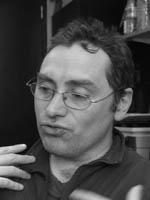 Rab Swannock Fulton is a Glaswegian poet, short story writer, novelist and Salsa dancer now living in Galway, West Ireland.
Rab Swannock Fulton is a Glaswegian poet, short story writer, novelist and Salsa dancer now living in Galway, West Ireland.
In 2004 Fionnuala Gallagher, the Arts Officer of National University of Ireland, Galway (NUI, G) commissioned Michelle Walsh to set up a website to bring Rab’s work together. The result of this collaboration can be seen at: frink.nuigalway.ie/~rab/
In 2005 a new novel, Transformation, was added to the site. The response to this story (readers’ reviews, word of mouth, commentary in blogs, etc) has helped the website built up an international readership. The most recent development has been the setting up of a newsletter in Connecticut to serialise Rab’s latest work. The newsletter, called GeyGallus, is edited by Andrea Okrentowich and can be read at: geygallus.writernetwork.com/
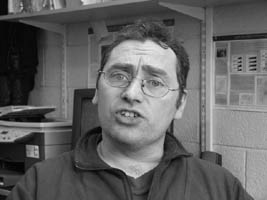 At present Rab is working on a new novel, The Woman Who Was Not Adele, which is set in the 1990s and is written from the perspective of a photographer who has to use a murdered woman’s identity to try and get back to England. The story starts off very dark but gradually becomes a more hope filled tale. The story travels across Liberia, Ireland, India, Sri Lanka and the Middle East. The tale takes the form of a series of loosely linked episodes – there is darkness, romance, comedy, tragedy, adventure, and finally revelation. Rab has also sketched out the plan for his next novel, a comedy horror tale called The Deeds of the Scots, which he will be begin work on in the autumn.
At present Rab is working on a new novel, The Woman Who Was Not Adele, which is set in the 1990s and is written from the perspective of a photographer who has to use a murdered woman’s identity to try and get back to England. The story starts off very dark but gradually becomes a more hope filled tale. The story travels across Liberia, Ireland, India, Sri Lanka and the Middle East. The tale takes the form of a series of loosely linked episodes – there is darkness, romance, comedy, tragedy, adventure, and finally revelation. Rab has also sketched out the plan for his next novel, a comedy horror tale called The Deeds of the Scots, which he will be begin work on in the autumn.
Rab Swannock Fulton is a supporter of Payday, which is a network of men who support the international women’s strike. Payday supports conscientious objectors, and is involved in the campaign to free Mehmet Tarhan, a gay Kurdish conscientious objector jailed in Turkey. Payday’s website is: www.refusingtokill.net/
© Rab Swannock Fulton 2006; chapter one image by Arthur B Frost, taken from Leis Carroll’s poem ‘Hiawatha’s Photographing’; chapter two image courtesy of Irish Eyes, taken from morguefile.com ; chapter three image
© EC/ECHO/Fran
çois Goemans europa.eu.int/comm/echo/ ; author photographs © Pauhla McGrane.

Comments